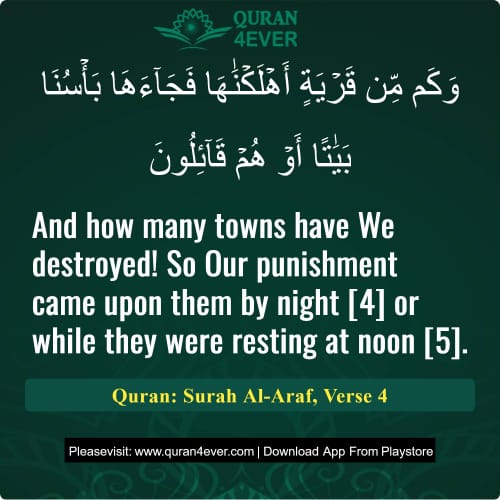
Transliteration:( Wa kam min qaryatin ahlaknaahaa fajaaa'ahaa ba'sunaa bayaatan aw hum qaaa'iloon )
"And how many towns have We destroyed! So Our punishment came upon them by night [4] or while they were resting at noon [5]."
This is during the last portion of the night, just before dawn, when everybody is in deep slumber and people are unable to escape. From this we learn that the last portion of the night is a time of obtaining Divine Mercy for those engrossed in the remembrance of Allah Almighty, and for the negligent, it is the time of Divine punishment. It is for this reason that the performance of Tahajjud Prayer is most appropriate, with which to extinguish the fire of Divine wrath.
In short, punishment was sent upon them at such a time when they had least suspected it. On most, it came during the last portion of the night, and on some, during their afternoon rest time. There was not the slightest sign of the impending punishment. It would come suddenly and unexpectedly—otherwise, they would not have been resting.
4. And a great number of towns We destroyed. Our torment came upon them by night or while they were taking their midday nap. 5. No cry did they utter when Our torment came upon them but this: “Verily, we were wrongdoers.” 6. Then surely, We shall question those (people) to whom it was sent and verily, We shall question the Messengers. 7. Then surely, We shall narrate unto them (their whole story) with knowledge, and indeed We have not been absent.
Allah said,
(And a great number of towns We destroyed.) for defying Our Messengers and rejecting them. This behavior led them to earn disgrace in this life, which led them to disgrace in the Hereafter. Allah said in other Ayat,
(And indeed (many) Messengers before you were mocked at, but their scoffers were surrounded by the very thing that they used to mock at) ﴿6:10﴾, and
(And many a township did We destroy while they were given to wrongdoing, so that it lie in ruins (up to this day), and (many) a deserted well and lofty castle!) ﴿22:45﴾, and,
(And how many a town have We destroyed, which was thankless for its means of livelihood And those are their dwellings, which have not been inhabited after them except a little. And verily, We have been the heirs)﴿28:58﴾. Allah’s saying,
(Our torment came upon them by night or while they were taking their midday nap. ) means, Allah’s command, torment and vengeance came over them at night or while taking a nap in the middle of the day. Both of these times are periods of rest and leisure or heedlessness and amusement. Allah also said
(Did the people of the towns then feel secure against the coming of Our punishment by night while they were asleep Or, did the people of the towns then feel secure against the coming of Our punishment in the forenoon while they were playing)﴿7:97-98﴾ and,
(Do then those who devise evil plots feel secure that Allah will not sink them into the earth, or that the torment will not seize them from directions they perceive not Or that He may catch them in the midst of their going to and from, so that there be no escape for them Or that He may catch them with gradual wastage. Truly, Your Lord is indeed full of kindness, Most Merciful) ﴿16:45-47﴾. Allah’s saying;
(No cry did they utter when Our torment came upon them but this: “Verily, we were wrongdoers.”) This means, when the torment came to them, their cry was that they admitted their sins and that they deserved to be punished. Allah said in a similar Ayah,
(How many a town given to wrongdoing, have We destroyed)﴿21:11﴾, until,
(Extinct)﴿21:15﴾. Allah’s saying.
(Then surely, We shall question those (people) to whom it (the Book) was sent) is similar to the Ayat,
(And (remember) the Day (Allah) will call them, and say: “What answer gave you to the Messengers”) ﴿28:65﴾, and,
(On the Day when Allah will gather the Messengers together and say to them: “What was the response you received” They will say: “We have no knowledge, verily, only You are the Knower of all that is unseen.”) ﴿5:109﴾. Allah will question the nations, on the Day of Resurrection, how they responded to His Messengers and the Messages He sent them with. He will also question the Messengers if they conveyed His Messages. So, `Ali bin Abi Talhah reported from Ibn `Abbas, who said commenting on the Ayah:
(Then surely, We shall question those (people) to whom it (the Book) was sent and verily, We shall question the Messengers.) He said; “About what they conveyed.” Ibn `Abbas commented on Allah’s statement,
(Then surely, We shall narrate unto them (their whole story) with knowledge, and indeed We have not been absent.) “The Book will be brought forth on the Day of Resurrection and it will speak, disclosing what they used to do.”
(and indeed We have not been absent) meaning, On the Day of Resurrection, Allah will inform His servants about what they said and did, whether substantial or minor. Certainly, He witnesses to everything, nothing escapes His observation, and He is never unaware of anything. Rather, He has perfect knowledge of what the eyes are deluded by and what the hearts conceal,
(Not a leaf falls, but He knows it. There is not a grain in the darkness of the earth nor anything fresh or dry, but is written in a Clear Record.)﴿6:59﴾
(7:4) How many a township We have destroyed! Our scourge fell upon them at night, or when they were taking midday rest.
There is no commentary by Abul Maududi available for this verse.

For a faster and smoother experience,
install our mobile app now.
Related Ayat(Verses)/Topics